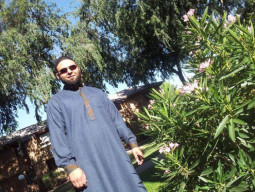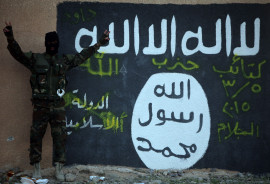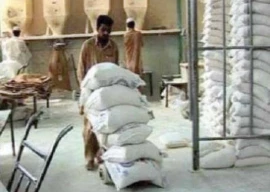
The bombing of a Shia mosque in eastern Saudi Arabia is a telling development. It signals the likely direction in the next phase of the Islamic State (IS) mission after its war in Iraq and Syria. In Iraq, the IS has consolidated its position with the capture of Mosul, Fallujah and Ramadi. Baghdad is only 100km away. A fragmented Iraqi state can hardly put up the needed resistance if and when the time for the IS is to move on towards the Iraqi capital. In the US, a consensus exists that Iraq’s military and government simply do not have it in them to face the IS threat. Even more tellingly, the Americans plan to do nothing about it; they are bitterly divided on it right in the middle. In Syria, the IS recently captured Palmyra, a UN heritage town with riches that can only add to the IS coffers.
Add to it the fact that the Isaf commander in Afghanistan believes that the IS has made inroads there. Rightly, he suggests that those who have grown in a terror economy may just be rebranding to keep their trade alive, and the IS is as good a brand as any in this field. This is also proven by former Afghan Taliban elements allegedly splitting into two factions; the core Taliban who retain their Afghan centrism, and those who have bolted from under it to seek newer patrons like the IS. Afghanistan’s current spate of violence is essentially a war for expanded turf and influence between these two mutants.
Such attrition in an internecine conflict can only be beneficial in the short-term to American and Afghan interests, obviating any chance for intervention by the American forces to stem the violence. Implicitly, however, the IS continues to be entrenched as a relevant player via its proxies even while it is not physically present yet on the scene. What long-term implications will that inject is easily surmised, given the experience that each proxy player in this region has left in its wake since 1979. The Mujahideen of yore and the TTP of today are responsible for the havoc that both Afghanistan and Pakistan have borne since the war in the region began three decades back; as well as the sympathetic infusion of instability that entities like al Qaeda and the IS engender in the entire region.
In Pakistan, too, there are claimants to the IS mantle. Whether those are self-appointed or carry an informal approval of the IS Main is yet to be determined. The Safoora killings of May 13, however — just as the eastern Saudi bombings — serve as a wake-up call. The findings from the Safoora investigations may not be publicly revealed given the sensitivity of the matter and how a future strategy might be dictated, but two possible sponsors loom: association of the suspects with a local sectarian outfit, of which one or two are particularly well-known and have been frequently mentioned; or the IS, of which reports state material evidence was found from the crime scene. If indeed the IS is the real sponsor, and Saad Aziz will lead us to that, the shadow of it will loom large as it acts to exploit existing cleavages.
The question: is the Pakistani security construct still reading off the old page? Or, is it alive to what may have become the next challenge? Going by what the incumbent Corps Commander Peshawar stated to such a question, and what the interior minister had to say about the presence of Daesh in Pakistan, the signs are ominous. The Pakistani security establishment — which must compose of all organs of the state vested with such responsibility — is dislocated in its assessment and is reading off the wrong page.
Why so, and why is the IS’ newer move dangerous? While the IS may seem stagnated in Syria, despite Palmyra, the Hezbollah, heretofore the most potent anti-IS player has recently appealed for world support to fight the IS. That may have something to do with the restricted flow of arms from Iran because of Israeli sensitivities and Iran’s ongoing effort at rapprochement with the US, but that also indicates the growing persona of the IS as a formidable force. Closer to home in Iraq, the IS may seem to have drawn with the Kurds for the moment in one geographical corner, but it is well aware that the real fight to its final push towards Baghdad could only come from Iran.
Although Iran is already present in Iraq in certain strength, the full might of its force will invite itself into fighting the IS were the IS to threaten the complete takeover of Iraq — by some counts only a matter of time — and pose Iran the ultimate threat. Which really means that for the IS to make that final move on Baghdad, it must relocate Iran’s focus elsewhere. What better than the two places, Afghanistan and Pakistan, to needle Iran’s soft underbelly. If that happens to be Pakistan’s soft belly too, voila. There is rarely ever a two-in-one in geo-strategy. If Iran also entangles with Saudi Arabia, or vice versa, the dividends for the IS remain fortuitous.
Ever heard of Jundullah — more so, lately — a self-declared adherent of the IS in Pakistan? Or maybe now the appointed adherent of the IS in Pakistan. The co-presence of both the Jundullah and the former Lashkar-e-Jhangvi in Balochistan becomes an ominous nexus that could forge that all-important avenue for the IS to find its feet in Pakistan. Will Saad Aziz lead us to this conclusion? I hope he does, because there isn’t a moment to waste in getting back the control of Balochistan’s voids from the nationalist-religious combine which could shield the infusion of IS proxies confounding the security scene further. An unattended development on those lines could push the region to a larger Pakistan-Iran stand-off. Only a deft understanding and handling can ensure that the voids are suitably covered.
What else may Pakistan do? Cover the vulnerabilities — for Karachi, revert to the other Corps Commander’s suggestion of splitting the security apparatus off political control to enable a coherent response to the existing situation. Considering the unaffordable cost of failure, it is okay to let the security in Karachi be led by the military for the moment. Take the fight in Fata to its logical end; this is to be ready for the next phase elsewhere. While eliminating any incipient IS presence at home, help fight it as far away from Pakistan as is possible. Afghanistan? Saudi Arabia? The IS is a real and present danger. Saad Aziz may just get us to recognise it.
Published in The Express Tribune, May 30th, 2015.
Like Opinion & Editorial on Facebook, follow @ETOpEd on Twitter to receive all updates on all our daily pieces.
















































COMMENTS (8)
Comments are moderated and generally will be posted if they are on-topic and not abusive.
For more information, please see our Comments FAQ